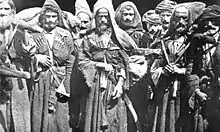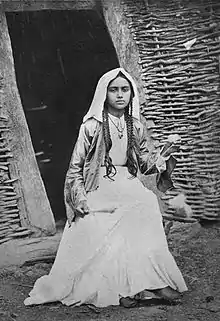Abkhazians
Abkhazians, or Abkhaz (Abkhaz: Аԥсуаа, Aṕswaа; apʰsʷɑɑ), are a Northwest Caucasian ethnic group, mainly living in Abkhazia, a disputed region on the northeastern coast of the Black Sea. A large Abkhaz diaspora population resides in Turkey, the origins of which lie in the population movements from the Caucasus in the late 19th century. Many Abkhaz also live in other parts of the former Soviet Union, particularly in Russia and Ukraine.[8]
Аԥсуаа | |
|---|---|
 | |
| Total population | |
| c. 748,391 | |
| Regions with significant populations | |
| Former Soviet Union | |
| 122,040 (2003 census)[2] | |
| 11,366 (2002 census)[3] | |
| 3,527[4] | |
| 1,458[5] | |
| Diaspora | |
| 100,000 (by descent)[6] | |
| c. 10,000[7] | |
| Languages | |
| Abkhaz (native), Russian, Georgian, Turkish | |
| Religion | |
| Predominantly Abkhazian Orthodox Christianity and Sunni Islam with Abkhaz native faith minority | |
| Related ethnic groups | |
| Abazins, Circassians | |
Ethnology
The Abkhaz language belongs to the isolate Northwest Caucasian language family, also known as Abkhaz–Adyghe or North Pontic family, which groups the dialectic continuüm spoken by the Abaza–Abkhaz (Abazgi) and Adyghe ("Circassians" in English).[9] Abkhazians are closely ethnically related to Circassians.[10] Classical sources speak of several tribes dwelling in the region, but their exact identity and location remain controversial due to Abkhaz–Georgian historiographical conflict.
Subgroups
There are also three subgroups of the Abkhaz people. The Bzyb (Бзыԥ, Bzyph) reside in the Bzyb River region, and speak their own dialect.[11] The Abzhui (Абжьыуа, Abzhwa) live in the Kodori River region, and also speak their own dialect, which the Abkhaz literary language is based upon.[11] Finally, there are the Samurzakan who reside in the southeast of Abkhazia.[11]
History
Some scholars deem the ancient Heniochi tribe the progenitors of the Abkhaz.[12] This warlike people came into contact with Ancient Greeks through the colonies of Dioskourias and Pitiuntas.[12] In the Roman period, the Abasgoi are mentioned as inhabiting the region.[12] These Abasgoi (Abkhaz) were described by Procopius as warlike, worshippers of three deities, under the suzerainty of the Kingdom of Lazica.[12] The Abkhazian view is that the Apsilae and Abasgoi are ancestors of the Abkhaz–Adyghe group of peoples, while the Georgian view is that those were Colchians (Kartvelians or Georgians).[13]
.jpg.webp)
Lazica was a vassal kingdom of the Byzantine Empire throughout most of its existence. Later the independent Kingdom of Abkhazia was established and the region became a part of the Georgian cultural world. The local nobility, clergy and educated class used Georgian as a language of literacy and culture. Georgian would remain the second language for many Abkhaz until Russian replaced it in the early 20th century. From the early 11th to the 15th century, Abkhazia was a part of the all-Georgian monarchy, but then became a separate Principality of Abkhazia only to be conquered by the Ottomans.

Towards the end of the 17th century, the region became a theatre of widespread slave trade and piracy. According to a controversial theory developed by Pavle Ingorokva in the 1950s, at that time a number of the Northwest Caucasian pagan Abaza tribes migrated from the north and blended with the local ethnic elements, significantly changing the region's demographic situation. These views were described as ethnocentric and having little historical support.[14][15] They served as intellectual support to the Stalin-era assimilation policy[16] and had a profound influence on the Georgian nationalism in the 1980s.[17]

The Russian conquest of Abkhazia from the 1810s to the 1860s was accompanied by a massive expulsion of Muslim Abkhaz to the Ottoman Empire and the introduction of a strong Russification policy. As a result, the Abkhaz diaspora is currently estimated to measure at least twice the number of Abkhaz that reside in Abkhazia. The largest part of the diaspora now lives in Turkey, with estimates ranging from 100,000 to 500,000, with smaller groups in Syria (5,000 – 10,000) and Jordan. In recent years, some of these have emigrated to the West, principally to Germany (5,000), the Netherlands, Switzerland, Belgium, France, the United Kingdom, Austria and the United States (mainly to New Jersey).[18]
After the Russian Revolution of 1917, Abkhazia was a part of the Democratic Republic of Georgia, but was conquered by the Red Army in 1921 and eventually entered the Soviet Union as a Soviet Socialist Republic associated with the Georgian SSR. The status of Abkhazia was downgraded in 1931 when it became an Autonomous SSR within the Georgian SSR. Under Joseph Stalin, a forcible collectivization was introduced and the native communist elite purged. The influx of Armenians, Russians and Georgians into the growing agricultural and tourism sectors was also encouraged, and Abkhaz schools were briefly closed. By 1989, the number of Abkhaz was about 93,000 (18% of the population of the autonomous republic), while the Georgian population numbered 240,000 (45%). The number of Armenians (15% of the entire population) and Russians (14%) grew substantially as well.
The 1992–1993 War in Abkhazia followed by the ethnic cleansing of Georgians in Abkhazia[19]left the Abkhaz an ethnic plurality of ca. 45%, with Russians, Armenians, Georgians, Greeks, and Jews comprising most of the remainder of the population of Abkhazia. The 2003 census established the total number of Abkhaz in Abkhazia at 94,606.[2] However, the exact demographic figures for the region are disputed and alternative figures are available.[20] The de facto Abkhaz president Sergey Bagapsh suggested, in 2005, that less than 70,000 ethnic Abkhaz lived in Abkhazia.[21]
At the time of the 2011 Census, 122,175 Abkhaz were living in Abkhazia. They were 50.8% of the total population of the republic.[22]
In the course of the Syrian uprising, a number of Abkhaz living in Syria immigrated to Abkhazia.[7] By mid-April 2013, approximately 200 Syrians of Abkhaz descent had arrived in Abkhazia.[23][24] A further 150 were due to arrive by the end of April.[23] The Abkhazian leadership has stated that it would continue the repatriation of Abkhaz living abroad.[24] As of August 2013, 531 Abkhaz had arrived from Syria according to the Abkhazian government.[25]
Economy
The typical economy is strong on the breeding of cattle, beekeeping, viticulture, and agriculture.[11]
Religion
The Abkhaz people are principally divided into Abkhazian Orthodox Christian and Sunni Muslim (Hanafi) communities[11] (prevalent in Abkhazia and Turkey respectively) but the indigenous non-Abrahamic beliefs have always been strong.[26] Although Christianity made its first appearance in the realm of their Circassian neighbours in the first century AD via the travels and preaching of the Apostle Andrew,[27] and became the dominant religion of Circassians in the 3rd to 4th centuries, Christianity became the dominant religion of Abkhazians in the 6th century during the reign of Byzantine emperor Justinian I, and continued to be followed under the kings of Georgia in the High Middle Ages. The Ottomans introduced Islam in the 16th century and the region became largely Muslim gradually until the 1860s. When much of the Muslim population was ethnically cleansed in the late 19th century, Christians once again became the majority in the region.
Diaspora
Many Muslim Cherkess, Abkhaz and Chechens migrated to the Ottoman Empire following revolts against Russian rule.[28] It is believed that the Abkhaz community in Turkey is larger than that of Abkhazia itself.[28] Some 250 Abkhaz-Abaza villages are estimated throughout Turkey.[28] According to Andrew Dalby, Abkhazian-speakers might number more than 100,000 in Turkey,[29] however, the 1963 census only recorded 4,700 native speakers and 8,000 secondary speakers.[30] Of the 15,000 ethnic Abkhaz in Turkey, only 4,000 speak the language, the rest having assimilated into Turkish society.[31]
Gallery
 Children waving miniature Abkhazian flags
Children waving miniature Abkhazian flags
 Parade exhibiting Abkhazian flags
Parade exhibiting Abkhazian flags.jpg.webp) Abkhaz and Georgian generals
Abkhaz and Georgian generals Conference of Abkhazian nobility in 1839
Conference of Abkhazian nobility in 1839 Abkhaz in the mid-19th century
Abkhaz in the mid-19th century Woman wearing dress modelled after the Abkhazian flag
Woman wearing dress modelled after the Abkhazian flag A girl holding a heart-shaped balloon with the Abkhazian flag on it
A girl holding a heart-shaped balloon with the Abkhazian flag on it
Notable people
Literature
- Fazil Iskander (1929–2016), writer
- Alexey Gogua, (born 1932), writer
- Bagrat Shinkuba (1917–2004), writer, poet
Politics
- Ali Bey Al-Kabir (1728–1773), Mamluk leader of Egypt
- Sergei Bagapsh (1949–2011), President of Abkhazia
- Rauf Orbay (1881–1964), Turkish politician
- Hayreddin Pasha (1820–1890), Ottoman politician
See also
References
- Abkhazia is the subject of a territorial dispute between the Republic of Abkhazia and Georgia. The Republic of Abkhazia unilaterally declared independence on 23 July 1992, but Georgia continues to claim it as part of its own sovereign territory and designates it as a territory occupied by Russia. Abkhazia has received formal recognition as an independent state from 7 out of 193 United Nations member states, 1 of which has subsequently withdrawn its recognition.
- (2003) 2003 Census statistics (in Russian)
- Всероссийская перепись населения 2002 года - 1. Национальный состав населения [All-Russia Population Census of 2002 - 1. The national composition of the population] (in Russian). Russian Federal State Statistics Service. 2004. Archived from the original (XLS) on 29 February 2016.
- "Turkish Abkhazians enjoying independence of their far away country". Abkhaz World | History, Culture & Politics of Abkhazia.
- "All-Ukrainian population census 2001 - The distribution of the population by nationality and mother tongue". State Statistics Service of Ukraine. Archived from the original on 11 March 2007. Retrieved 29 March 2006.
- see diaspora section
- "Abkhaz Syrians return home". Voice of Russia. 5 May 2012. Archived from the original on 11 May 2012. Retrieved 9 May 2012.
- "The journey of Frédéric Dubois de Montpéreux in the Caucasus, to the Cherkhesians and Abkhazians, in Colchida, in Georgia, in Armenia and Crimea". silk.european-heritage.net. Archived from the original on 20 July 2006.
- Asya Pereltsvaig (9 February 2012). Languages of the World: An Introduction. Cambridge University Press. pp. 66–. ISBN 978-1-107-00278-4.
- Moshe Gammer (25 June 2004). The Caspian Region, Volume 2: The Caucasus. Routledge. pp. 79–. ISBN 978-1-135-77540-7.
- Hoiberg, Dale H., ed. (2010). "Abkhaz". Encyclopædia Britannica. I: A-ak Bayes (15th ed.). Chicago, Illinois: Encyclopædia Britannica Inc. pp. 33. ISBN 978-1-59339-837-8.
- Olson 1994, p. 6.
- Smith 1998, p. 55.
- Smith 1998, p. 55.
- de Waal, Thomas (2010). The Caucasus: an introduction. Oxford University Press. p. 151. ISBN 978-0-19-539976-9.
- Coppieters, Bruno (2004). Europeanization and conflict resolution: case studies from the European periphery. America Press. p. 196. ISBN 978-90-382-0648-6.
- Chirikba 2003 pp. 6-8
- title=ethnic cleansing of Georgians in Abkhazia
- Georgians and Abkhazians. The Search for a Peace Settlement (Notes and References section), by various authors, Vrije Universiteit Brussel, August 1998.
- Bagapsh Speaks of Abkhazia’s Economy, Demographic Situation. Civil Georgia. 10 October 2005
- "население абхазии". www.ethno-kavkaz.narod.ru.
- James Brooke (15 April 2013). "Syrian Refugees Go 'Home' to Former Russian Riviera". Voice of America. Retrieved 22 April 2013.
- "Over two hundred representatives of the Abkhazian diaspora in Syria want to return to their historical homeland". Abkhaz World. 2 April 2013. Archived from the original on 26 July 2013. Retrieved 22 April 2013.
- ""Repatriates" settling in Abkhazia". The Messenger. 7 August 2013. Retrieved 31 August 2013.
- Johansons, Andrejs. (Feb. 1972) The Shamaness of the Abkhazians. History of Religions. Vol. 11, No. 3. pp. 251–256.
- Taylor, Jeremy (1613–1667). Antiquitates christianæ, or, The history of the life and death of the holy Jesus as also the lives acts and martyrdoms of his Apostles: in two parts. p. 101.
- Tracey German (8 April 2016). Regional Cooperation in the South Caucasus: Good Neighbours Or Distant Relatives?. Routledge. pp. 110–. ISBN 978-1-317-06913-3.
- Andrew Dalby (28 October 2015). Dictionary of Languages: The definitive reference to more than 400 languages. Bloomsbury Publishing. pp. 1–. ISBN 978-1-4081-0214-5.
- Gachechiladze 2014, p. 81.
- Steven L. Danver (10 March 2015). Native Peoples of the World: An Encyclopedia of Groups, Cultures and Contemporary Issues. Routledge. pp. 259–. ISBN 978-1-317-46400-6.
Sources
- George Hewitt (19 November 2013). The Abkhazians: A Handbook. Routledge. pp. 37–. ISBN 978-1-136-80205-8.
- Gachechiladze, Revaz (17 January 2014). The New Georgia: Space, Society, Politics. Routledge. pp. 81–. ISBN 978-1-317-76256-0.
- Chirikba, Viacheslav (2003). Abkhaz. Languages of the World/Materials. 119. Munich: LINCOM EUROPA. ISBN 3-89586-136-7.
- Giunashvili, Dzh. (1982). "ABḴĀZ". Encyclopaedia Iranica, Vol. I, Fasc. 2. pp. 222–224.
- Olson, James Stuart (1994). An Ethnohistorical Dictionary of the Russian and Soviet Empires. Greenwood Publishing Group. ISBN 978-0-313-27497-8.
- Smith, Graham (1998). Nation-building in the Post-Soviet Borderlands: The Politics of National Identities. Cambridge University Press. pp. 55–. ISBN 978-0-521-59968-9.
- David Marshall Lang, Caucasian Studies, University of London, 1964, Vol.1
- Roger Rosen, Georgia: Sovereign Country of the Caucasus, Odyssey, 2004, ISBN 962-217-748-4
- Tsibenko, Veronika (2013). "Abkhāz". In Fleet, Kate; Krämer, Gudrun; Matringe, Denis; Nawas, John; Rowson, Everett (eds.). Encyclopaedia of Islam, THREE. Brill Online. ISSN 1873-9830.
